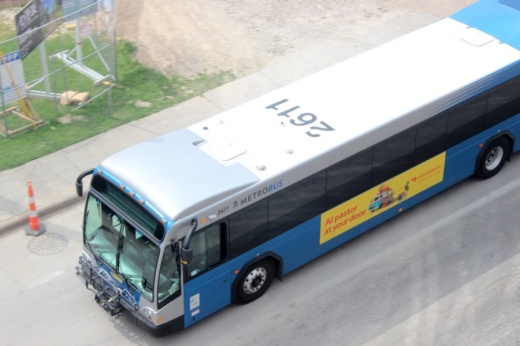On local service, including buses and the University of Texas shuttle, someone who takes the bus twice a day on five days a week would pay $50 in a month for those commutes if paying for each ride. If that person bought a 31-day pass, the cost would be $41.25.
Similarly, riders who take the MetroRail or a MetroExpress route from outside of town into the city for work would pay $140 in a month if they paid for each ride, but that total cost goes down to $96.25 for a 31-day pass.
The system rewards riders who use public transportation frequently and encourages commuting using public transit by offering a discount. However, it also creates a barrier: Those who are not able to afford the upfront cost of the pass miss out on the discount and ultimately pay more to use public transportation than those with the means to afford the pass.
A new pilot program from Capital Metro is aimed at addressing that inequity. The program, which started in October and runs for six months, will track customers' rides and automatically cap them daily and by month. That means if a customer takes a third ride on public transportation in one day, it is free, because that individual has already exceeded the fare for a day pass. Also, if a customer pays by ride and hits the cost of a monthly pass within a 31-day period, they will ride for free for the rest of the month. Participants can sign up online at Capital Metro's website for the initiative if they are already enrolled in certain public aid programs. After the initial program ends, Chief Financial Officer Reinet Marneweck said the public transit organization hopes to expand the program to wider use.
"We will have up to 200 participants, and we will get their input towards designing the future program," Marneweck said.
Some other cities have put similar initiatives in place. For example, Houston gives unlimited rides starting with the third trip of the day. Portland gives a day pass to anyone who spends $5 in a day and a month pass to anyone who spends $100 monthly, and Indianapolis caps fares at $4 daily and $15.75 weekly.
In addition to the fare-capping system, Capital Metro has added new technology for customers who do not have a credit card or do not want to use one to load their account with cash and use the app. Those individuals can find a network of retail stores on the app, such as 7-Eleven, CVS, Dollar General and Family Dollar locations, where they can pay cash, present a bar code at the register and load the credit onto their app.
The two new initiatives, which cost $133,230, according to Marneweck, are part of a $30 million investment in technology systems Capital Metro plans to make over the next four years as part of Project Connect—the $7.1 billion transit plan voters approved Nov. 3.
Marneweck said future planned initiatives include smart cards customers can reload, as well as onboard fare readers that allow customers to tap their credit cards without having to download the app or use cash.





